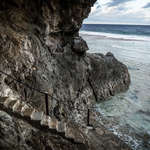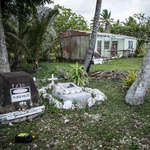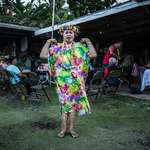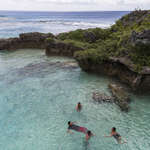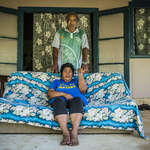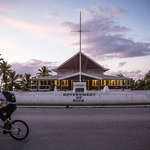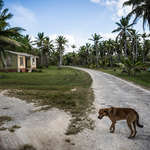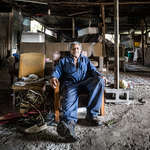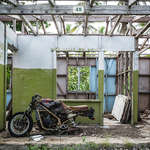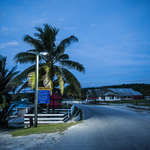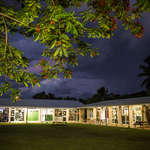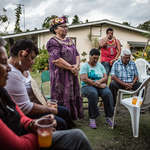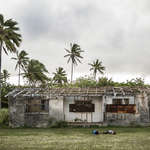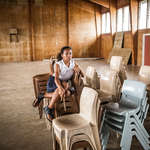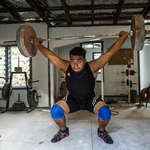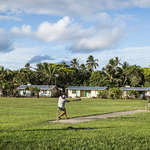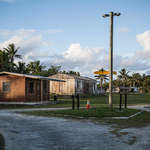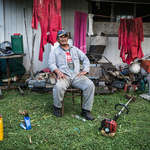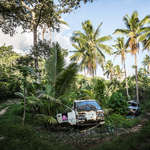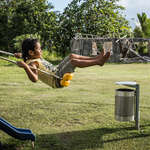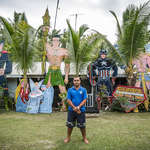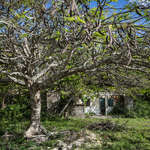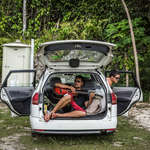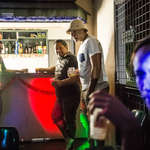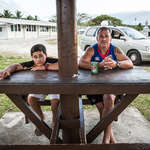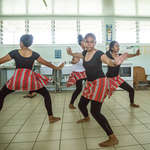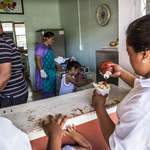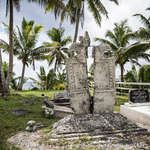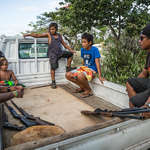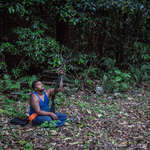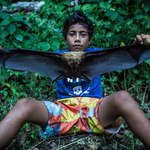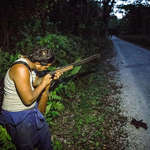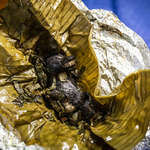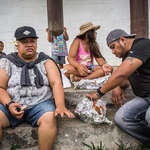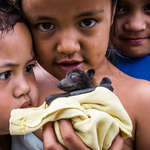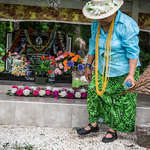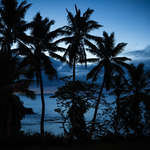
-
The tiny island of Niue in the South Pacific, also known as the Rock of Polynesia, is one of the most remote places on earth. It can only be accessed by plane, on a three and a half hour flight from Auckland, which flies once or twice a week, or by private yacht. Although Niue has a Prime Minister, a parliament and a flag, the country remains in free association with New Zealand after choosing self-government, rather than full independence, in a 1974 referendum. Technically executive power lies with Queen Elizabeth II in her role as Queen of New Zealand and her Governor General in New Zealand. In practice, Niue’s Prime Minister and his ministers run the territory’s affairs. Nieuans hold New Zealand passports and since there are hardly any jobs on the island, some 20,000 Niueans (or 90-95%) of the population have emigrated to New Zealand.
Today, Niue is one of the least populous countries on the planet. With less than 1,500 permanent residents it is only slightly busier than Tokelau, also a New Zealand dependency, and Vatican City.
-
The population is shrinking every year, with the young generation generally departing to study in New Zealand and others heading further south in search of gainful employment. To the first-time visitor, therefore, Niue can seem like a ghost-country. Abandoned homes litter the landscape and can be found in each of the island’s 14 villages. Few cars and motorcycle occasionally trundle along the island’s few paved roads and Alofi, the capital, lies mainly deserted, especially on Sundays.
Desperate to halt the decline in population, the government invited migrants from Tuvalu, another diminutive Pacific island nation of some 10,000 people perched on nine overcrowded and low lying atolls measuring no more than 26 square kilometres. Some 100 Tuvaluans heeded the call in the early 2000s and were settled in Vaiea village in the island’s south.

-
The scheme hasn’t quite worked as intended, however, since many Tuvaluans took advantage of being granted residency permits for New Zealand and moved further South. The ones who have stayed, see themselves as the first ‘climate change refugees’, however, enjoy their new life and the relative abundance of space and safety from rising sea levels.
Once a year, sleepy Niue springs to life when relatives and friends who have settled in New Zealand, return ‘home’ for Christmas and New Year’s celebrations. Visitors also take the opportunity to pay their respects at the graves of ancestors who lie buried on the island.
-
Locals put on feasts for the visiting relations by cooking specialities such as giant coconut crab and other seafood delicacies but also offer the local staple source of protein – roasted bat. Bat hunting is a popular pastime for local men and boys who shoot the nocturnal creatures and bring them home to be wrapped in foil or a leaf to be cooked on hot stones.
After New Year the island empties of festive visitors again and returns to its slow tranquility. Those Niueans who have chosen to remain on the island are proud of their country. As 47-year-old John Loae, who works in the local fishing industry, puts it: ‘We don’t have any problems here. We’ve got land to work, we have the sea to fish. We don’t have wars, we don’t pay for anything other than electricity and phone bills. Everything else is free – we live like in paradise.’
A stone staircase leads down to the Tautu sea track and reef, one of the few tourist attractions on the island of Niue.
An abandoned house and gravestones in Liku village in the eastern part of Niue. In the 1960s, more then 500 people lived in Liku, but since the 1970s Liku, like much of Niue, has suffered from significant population decline. Nowadays only about 40 Niueans still reside here, while the majority have emigrated to New Zealand.
Tapu Judith, 58, wearing a flowery dress and a garland of flowers, stands in front of her house in Tuapa village. 'I went to work and live to Australia for five years, me and my husband thought that we will be making a lot of money. But later we realised that it was just a dream, we had to pay so many bills, life is very expensive there. Here we have our house, we have our land, our family. Niue is a unique place, a place where we want to live and die.'
People swim in the Limu Pools in the northern part of Niue. Limu Pools is the only place on the island where people can swim safely as Niue doesn't have any sandy beaches.
Foag Kaiuha, 60, with his wife Nere Kaiuha, 61, in front of their house in Liku village. Foag: 'I went to NZ only to study, then I came back home. For 41 years I've worked for the Niue government. When I started working, I was making only 17 cents per hour. It was very small, but I've never complained, Niue has little income, why would I make myself rich of other people that don't have money. Now salaries in Niue are much higher, but still not as high as in New Zealand or Australia. But we don't pay land taxes here, we work only 4 days a week, and we can live from our gardens.'
A tourist cycles past the Niue Government building in Alofi, the capital. The Niue Constitution Act grants executive authority to the Queen of the United Kingdom in her role as monarch of New Zealand and to her Governor-General of New Zealand. In everyday practice sovereignty is exercised by the Niue Cabinet of Ministers, comprising the premier and three other ministers. The premier and ministers are members of the Niue Legislative Assembly, the nation's parliament.
A dog on a road in Liku village in the eastern part of Niue, where most of the houses have been abandoned.
Toniu Fakau, 70, one of a few residents of Liku village who has decided not to leave Niue. 'I stay in Niue because this is my land and I love it. I can't judge people that chose to live to New Zealand. It's their life, I live my life. Of course I would like to have some people around to talk to... All my sons are all gone. Only me and my wife stay here. Only 14 families living now in Liku. Before we had 500 people living here, now only just about 40 of them are still here.'
A body of a motorcycle left by its owners in an abandoned house in Liku village. Due to the high level of unemployment on the island many Niueans left their homes and migrated to New Zealand where they have much better job opportunities than in their own country.
The empty main street of Alofi, the capital of Niue. Alofi has the distinction of being the second smallest national capital city in terms of population after Ngerulmud, the capital of Palau.
The only shopping centre in Niue is located in the centre of Alofi village. Commerce, tourism and government jobs give most of the income to Niue residents, which is not enough to provide jobs for the whole population.
Niueans pray before having their Christmas meal at Tuapa village. Many locals come to Niue from New Zealand to visit their relatives during the Christmas period. In different parts of the island local families organise Christmas dinners and anyone, including tourists, can be invited to join.
Children lie on the grass near an abandoned house in Lakepa village. Lakepa is one of many villages in Niue where most residents have emigrated to New Zealand.
Yasmin, 12, sits on a stack of plastic chairs in a school gym. About 170 students attend classes at Niue High School. The majority of them will go to New Zealand to study or look for better job opportunities.
Rexricco Vilitama-Melekitama, 19, a Niuean weightlifter, performs the jerk portion of the lift at Alofi North Gym. Born in NZ, he moved back to Niue with his parents when he was one year old. 'Besides practising weightlifting I am learning carpentry. I want to build my own house here and stay here. Niue is very safe, there is no crime, everyone knows each other, we don't fight on the streets like in New Zealand. Here we never lock our houses or cars. We have a prison cell, but most people go there for drink driving. Many of my friends are now living in New Zealand, where they pay lots of bills, live on someone's land and follow someone's rules. I am a patriot, I don't want to go to live anywhere else, this is my home.'
People play cricket in Liku village where the majority of houses have been abandoned. The remaining residents are proud of their country and don't want to emigrate.
Liku village is one of many places in Niue where most of the houses have been abandoned by locals.
Ioae Jonh, 47, a worker at the National Fishery office, sits in front of his house. 'I chose to stay in Niue because it's an island and we don't have any problems here. We got the land to work, we have the sea to fish. We don't have wars, we don't pay for anything except for electricity and phone bills. Everything else is free, we live like in paradise.'
Abandoned car carcasses lie in a forest near Liku village.
Padosi, 5, sits on a swing near an abandoned house in Lakepa village, Eastern Niue.
Jin Nam Hopotoa, 19, is an elite athlete, discus thrower and national record holder, stands in front of his house in Tamakautoga village. His father made figures of national heroes, Bible characters and superheroes to decorate places where Christmas festivities are taking place. 'Niue is our home and it is our responsibility to support our small country and give something back to the community. We must do it out of respect to our ancestors who lived and worked here. I am staying her to inspire young people to do the same.'
An abandoned house in Hikutavake village. Many people have left the island due to lack of work.
A man sits in the boot of a car, playing his guitar, while other visitors from New Zealand rest at the Matapa picnic area. Niue is mainly visited by New Zealanders since access to the island is only possible from New Zealand by plane, which flies out of Auckland once or sometimes twice a week.
Locals drink at the Matapa Bar/Nightclub in Hikutavake village. Niue has a few clubs where locals go every Wednesday and Friday to drink and relax. Most of the time the clubs are half empty.
A father and son take a break at a picnic area of Alofi, the capital of Niue. Both are originally from Niue but now live in New Zealand and visit their home county only once or twice a year.
Female students from 8th class perform a traditional dance in preparation for the Prize Giving ceremony, that takes place every year at Niue High School in Paliati, Alofi. The best students will receive diplomas, cups and other prizes. School authorities encourage their students to stay in Niue after they graduate. Even though the South Pacific University has a branch in Niue, the majority of students will go to New Zealand to study or look for better job opportunities.
A young girl and her grandmother attend the Price Giving ceremony at Niue High School in Paliati, Alofi.
Students of Niue High School buy snacks at the school's fast food restaurant.
Niueans visiting from New Zealand and Australia to spend the Christmas and New Year period with their families and relatives dance in Matapa nightclub in Hikutavake village.
An old gravestone in Alofi cemetery, damaged by Cyclone Heta which hit Niue in January 2004. Cyclones strike the island at irregular intervals of 2-15 years. Since 1863, when records began, more than 30 tropical cyclones have affected Niue, causing death of people and destruction of property, infrastructure and agriculture.
Tuvalu immigrants that live in Vaeia village heading off to Huvalu Forest Conservation Area for bat hunting. Bats are not only a delicacy in Niue, but some villagers use bat meat for their everyday meals.
Tuvaluan young hunter from Vaeia village waits for a bat to shoot.
Dwain, 13, holds a bat that was shot by his grandfather.
Mac Talaiti, 24, reloads his rifle to continue bat hunting in Huvalu Forest Conservation Area at dusk.
A bat cooked in a leaf. Bats are usually roasted on hot stones and given to the visitors during village festivals.
A family eats breakfast at the entrance of a church in Vaiea village, during the annual village show day. Every year each village of Niue holds a show day festival where guests are offered traditional food and can see local performances.
Children from Vaeia village play with a bat that was brought to them by their parents.
Joy, 70, goes to the grave of her brother Brian every time she visits Niue. Joy lives in New Zealand, and comes to her home country once a year to spend Christmas with her relatives and honour family graves.
Sunset in Alofi village, the capital of Niue. Despite the fact that more then 90% of locals have been living in New Zealand and other nearby countries for decades, they still call Niue home.
